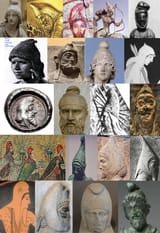Search Results
7/8/2025, 9:18:03 PM
>>509851370
>What came to be labelled as the Phrygian cap was originally used by several Iranian peoples, including the Scythians, the Medes, and the Persians. From the reports of the ancient Greeks, it appears that the Iranian variant also was a soft headdress and called a tiara
>Early Christian art (and continuing well into the Middle Ages) build on the same Greco-Roman perceptions of (Pseudo-)Zoroaster and his "Magi" as experts in the arts of astrology and magic, and routinely depict the "three wise men" (that follow a star) with Phrygian caps
>The Battle of the Ten Kings (Sanskrit: दाशराज्ञयुद्धम्, IAST: Dāśarājñá yuddhá) was first alluded to in the 7th Mandala of the Rigveda (RV). Sudas is mentioned in Rigveda as the chief of Bharatas who conquered the ten-kings confederacy. It is further mentioned that the king had replaced Vishwamitra with Vasishtha as his priest, thereby creating a rivalry between the two. The ten-kings, viz. Puru, Yadu, Turvasu, Anu, Druhyu, Alina, Paktha, Bhalanas, Siva and Vishanin, then revolted against Sudas but were defeated by him. He also fought Ajas, Sigrus and Yakshus soon after
>The heroes of this hymn, the Tṛtsus (a clan around seven successive kings belonging to the broader Bhārata dynasty, including Sudās), are Āryas and supported by Indra. The enemy camp as a whole is deemed anindra, “without Indra” (7:18:16), in a verse that seems to furnish the first instance of this term. Later books use this as a standard allegation of the enemies: “Indra-less destructive spirit” (RV 4:23.7), “how can those without Indra and without hymns harm me?” (RV 5:2:3), “enemies without Indra”, truth-haters (RV 1:133:1), “my enemies without Indra” (RV 10:48:7), “Indra-less libation-drinkers” (RV 10:27:6, according to Geldner 2003/3:166, a “reminiscence of 7:18:16”)
>What came to be labelled as the Phrygian cap was originally used by several Iranian peoples, including the Scythians, the Medes, and the Persians. From the reports of the ancient Greeks, it appears that the Iranian variant also was a soft headdress and called a tiara
>Early Christian art (and continuing well into the Middle Ages) build on the same Greco-Roman perceptions of (Pseudo-)Zoroaster and his "Magi" as experts in the arts of astrology and magic, and routinely depict the "three wise men" (that follow a star) with Phrygian caps
>The Battle of the Ten Kings (Sanskrit: दाशराज्ञयुद्धम्, IAST: Dāśarājñá yuddhá) was first alluded to in the 7th Mandala of the Rigveda (RV). Sudas is mentioned in Rigveda as the chief of Bharatas who conquered the ten-kings confederacy. It is further mentioned that the king had replaced Vishwamitra with Vasishtha as his priest, thereby creating a rivalry between the two. The ten-kings, viz. Puru, Yadu, Turvasu, Anu, Druhyu, Alina, Paktha, Bhalanas, Siva and Vishanin, then revolted against Sudas but were defeated by him. He also fought Ajas, Sigrus and Yakshus soon after
>The heroes of this hymn, the Tṛtsus (a clan around seven successive kings belonging to the broader Bhārata dynasty, including Sudās), are Āryas and supported by Indra. The enemy camp as a whole is deemed anindra, “without Indra” (7:18:16), in a verse that seems to furnish the first instance of this term. Later books use this as a standard allegation of the enemies: “Indra-less destructive spirit” (RV 4:23.7), “how can those without Indra and without hymns harm me?” (RV 5:2:3), “enemies without Indra”, truth-haters (RV 1:133:1), “my enemies without Indra” (RV 10:48:7), “Indra-less libation-drinkers” (RV 10:27:6, according to Geldner 2003/3:166, a “reminiscence of 7:18:16”)
Page 1
